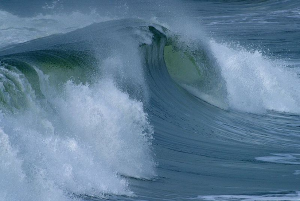 When most Westerners hear the word ‘tsunami’ they tend to think of far-flung countries like Japan or Indonesia, since our recent memory associates this type of disaster with these countries. But truth be told, tsunamis are a major threat to Western countries and an underrated one at that. It’s been a long time since these waves devastated our shores, but that may change in the near future.
When most Westerners hear the word ‘tsunami’ they tend to think of far-flung countries like Japan or Indonesia, since our recent memory associates this type of disaster with these countries. But truth be told, tsunamis are a major threat to Western countries and an underrated one at that. It’s been a long time since these waves devastated our shores, but that may change in the near future.
Take the Mediterranean for instance. Tsunamis rarely come to mind with most people when they think of that region, even though history is littered with shattered European and African cities that felt mother nature’s wrath. Recent research has found that a 7.0 earthquake could send waves all over the densely populated coastlines of the Mediterranean.
Researchers warn that while tsunamis in the Mediterranean are rare they tend to happen around once a century.
And they say larger earthquakes could trigger even more devastating waves, like the one that hit off the coast of Crete in 365AD with a magnitude of between 8 and 8.5.
The resulting tsunami destroyed ancient cities in Greece, Italy and Egypt, killing some 5,000 people in Alexandria alone.
More recently, an earthquake of magnitude 7 hit the Messina region in Italy in 1908, causing a tsunami that killed thousands, with waves exceeding 33ft (10 metres) in height.
And unlike most bodies of water, the Mediterranean is comparatively smaller, which means that there would be very little warning for anyone living along the coast, of which there are 130 million that live within a potential tsunami zone. Of course, Europeans aren’t the only Westerners that might have to deal with this disaster in the years ahead.
Many of the coastlines of the United States are potential tsunami zones. The Cascadia Faultline could devastate numerous cities in Washington and Oregon, and leave tens of thousands dead in an instant. That particular region has the potential to erupt with a 9.0 earthquake, which is somewhat overdue. Another little-known location is Florida, which doesn’t have a history of tsunamis, but still lies in a danger zone. 37 tsunamis have been recorded in the Caribbean since 1498, one of which was caused by earthquakes on the other side of the Atlantic. If one were to strike today, Florida’s low elevation could affect millions of Americans.
But the one place where no one would see it coming is New England. In 2013, a string of small earthquakes off the coast of Boston was a wake-up call for some researchers.
Tsunamis are extremely rare, but not unprecedented in the Atlantic Ocean. Ebel says tectonic conditions in the Pacific and Indian Oceans make tsunamis more likely in those regions; recent tsunamis in Japan and Indonesia killed thousands. In 1929, a magnitude 7.2 earthquake off the coast of Newfoundland caused a tsunami to hit Canada, killing 27 people, destroying thousands of homes and cutting transatlantic communication lines.
“I’m drawing an analogy from the 1929 area to this area that reaches to Boston,” Ebel says. “Geologically, it looks the same. The earthquakes are occurring right at the edge of the continental shelf.”
His research, based on several decades of earthquake data, suggests that the coasts between Nova Scotia and New Jersey are at highest risk for a tsunami.
As you can see, a tsunami can hit just about anywhere, and none of these scenarios take into account the possibility of an asteroid striking our planet. If this occurred, it would more than likely touch down on one of our oceans and inflict far more widespread damage than it would if it struck land. As of now, there are over 13,000 asteroids in Earth’s vicinity, of which 1,600 have been classified as “potentially hazardous.
Honestly, there isn’t a single coastline on Earth that is immune to this threat, and it’s about time that Westerners stopped thinking of it as something that only happens in exotic locales.
